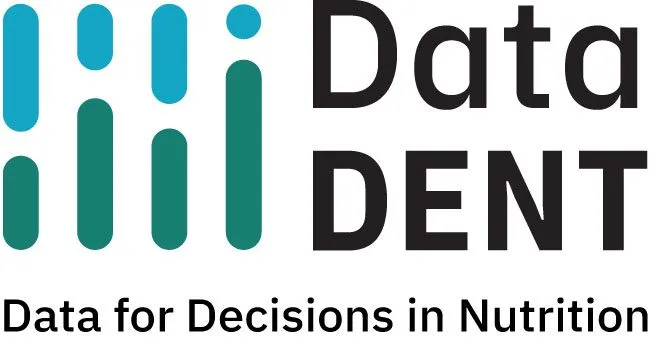The COVID-19 pandemic has had a significant impact on food security and nutrition. Organizations and initiatives have shared webinars, blogs, and additional resources to help governments, donors, program implementors, and other stakeholders on how to monitor and assess how COVID-19 threatens food systems and nutritional status of populations.
Below is a list of webinars on measuring food security and nutrition during COVID-19. We will update this list as additional webinars are posted.
Measuring Food Insecurity in the Era of COVID-19: Practical insights from data collection activities in four global contexts
Host: Data for Nutrition and Agriculture-Nutrition (Ag2Nut) Communities of Practice
Speakers: Divya Nair (IDinsight), Kenda Cunningham (Helen Keller International), Erin Biehl (Johns Hopkins Center for a Livable Future), Kusum Hachhethu (World Food Program)
Moderators: Jennifer Coates (Tufts University), Ed Frongillo (University of South Carolina)
Date: 06 May 2020
This webinar was the first in a series of webinars around nutrition data and monitoring during COVID-19 from the Data for Nutrition community of practice. It was co-hosted by the Ag2Nut community of practice in follow up to their webinar on COVID-19, Food Systems, and Nutrition.
Panelists shared practical insights on how they selected or modified experience-based food security metrics in household assessments using remote data collection modalities. Presentations highlighted rapid assessments conducted by ID Insight in India, program monitoring by community health workers for Helen Heller International’s SUAHHARA project in Nepal, food security assessment surveys conducted by the Johns Hopkins Center for a Livable Future in the United States of America, and the Mobile Vulnerability Analysis & Mapping (mVAM) program led by World Food Programme (WFP) across global contexts. Following the webinar, the communities of practice hosted a discussion to foster additional sharing of experiences conducting rapid food security assessments here.
Watch the recording [LINK]
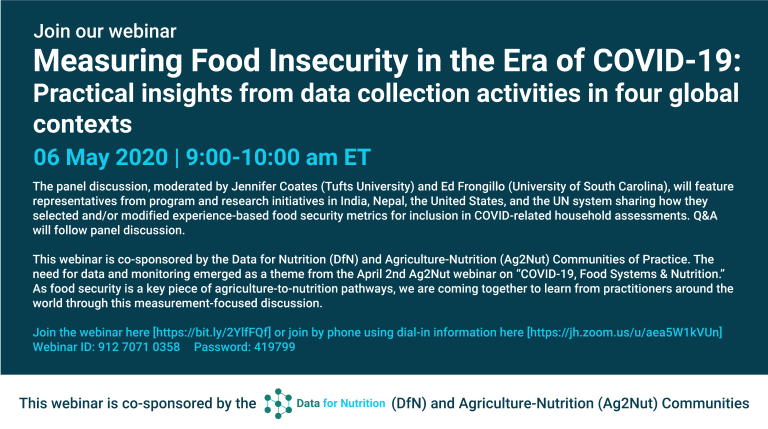
How to address key information gaps in food systems research under COVID-19 restrictions
Host: Irish Forum for International Agricultural Development (IFIAD)
Speakers: Shaun Ferris (Catholic Relief Services), Austen Moore (Catholic Relief Services), Kusum Hachhethu (World Food Program), Lynnette Neufeld (Global Alliance for Improved Nutrition)
Moderator: Charles Spilane (IFIAD), Robert O’Hagan (IFIAD)
Date: 08 July 2020
This webinar contributes to IFIAD’s COVID-19 and Agrifood Systems Resilience Web Portal. Panelists highlighted efforts from Catholic Relief Services (CRS), WFP, and the Global Alliance for Improved Nutrition (GAIN) in light of the COVID-19 pandemic. CRS shared challenges faced by country programs when trying to collect and use data to inform adaptations to the COVID-19 context, highlighting the need for support to analyze, synthesize, and extract key messages from the multitude of data being collected. To address these challenges, the CRS team uses a two dimensional approach for data collection (1) bi-weekly household, marketplace, and ports/border crossing surveys to monitor food and livelihood trends for immediate action; (2) monthly Measurement Indicators for Resilience Assessment (MIRA) household surveys to monitor resilience and well-being indicators. WFP highlighted the near real-time monitoring effort called Hunger Monitoring—previously known as mVAM—which utilizes live phone surveys for continuous, remote data collection, and automated data analysis and visualization. GAIN discussed data needs for food and market systems, and highlighted learnings from an online survey on how nutritious food producing small- and medium-sized enterprises have been affected by COVID-19.
Watch the recording [LINK]
Supporting Materials:
- Slide Deck [LINK]
- Report: Impacts of COVID-19 on small- and medium-sized enterprises in the food system [LINK]
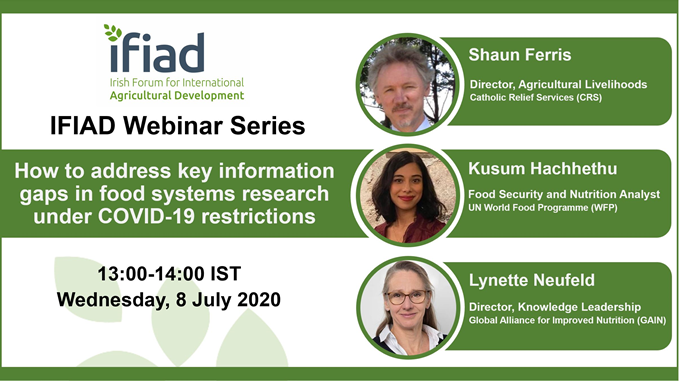
Nutrition information during the COVID-19 pandemic: Guidance and experiences from the field
Host: Technical Rapid Response Team (Tech RRT)
Speakers: Louise M. Mwirigi (UNICEF), Lucy Maina Gathigi (UNICEF Kenya), Mathieu Joyeux (UNICEF Zimbabwe), Alexandra Rutishauser-Perera (Action Against Hunger UK), Hazzan Ali Ahmed (Action Against Hunger Canada)
Moderator: Ben Allen (Tech RRT)
Date: 30 April 2020
This webinar was presented as part of a series by the Global Technical Assistance Mechanism for Nutrition (GTAM) to support IYCF-E, wasting, and nutrition information systems during COVID-19. Panelists reviewed guidance for nutrition surveillance and monitoring during COVID-19, and highlighted case studies from Zimbabwe and Kenya. Key messages emphasize the importance of utilizing existing digital platforms and data systems; leveraging remote data collection modalities; coordinating nutrition information activities to minimize the duplication of effort; and operationalizing nutrition monitoring frameworks to develop workplans for collection, analysis, and reporting of additional nutrition indicators.
Watch the recording [LINK]
Supporting Materials:
- Slide Deck [LINK]
- Guidance: Nutrition Information Management, Surveillance and Monitoring in the Context of COVID-19 [LINK]
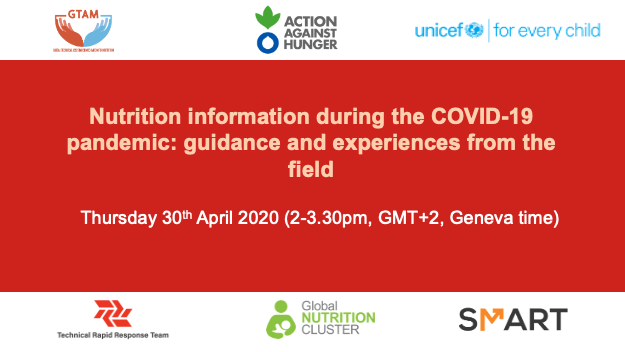
Near-Real-Time Monitoring of Food Crisis Risk Factors – State of Knowledge and Future Prospects
Host: Food Security Portal
Speakers: Arif Husain (WFP), Laura Glaeser (Famine Early Warning Systems Network), Mario Zappacosta (Food and Agriculture Organization), Daniel Maxwell (Tufts University), Chris Barrett (Cornell University), Kathy Baylis (University of Illinois), David Laborde (International Food and Policy Research Institute)
Moderator: Rob Vos (International Food and Policy Research Institute)
Date: 08 May 2020
This webinar was hosted by the Food Security Portal with support from the International Food and Policy Research Institute (IFPRI). Panelists discussed near-real-time monitoring systems including what is being developed, the quality of existing systems, and potential benefits of coordination. Presentations identified gaps, highlighted adaptations, and discussed opportunities to leverage technologies and integrate efforts for monitoring food crisis risk. Near-real-time monitoring systems examples included the WFP’s HungerMap, Famine Early Warning Systems Network’s (FEWS NET) Global Dashboard for Hotspot Identification (GHDI), and Food and Agriculture Organization’s (FAO) Global Information and Early Warning Systems for Food and Agriculture (GIEWS) and Food Price Monitoring and Analysis (FPMA) dashboards, among others.
View the original post [LINK]
Watch the recording [LINK]
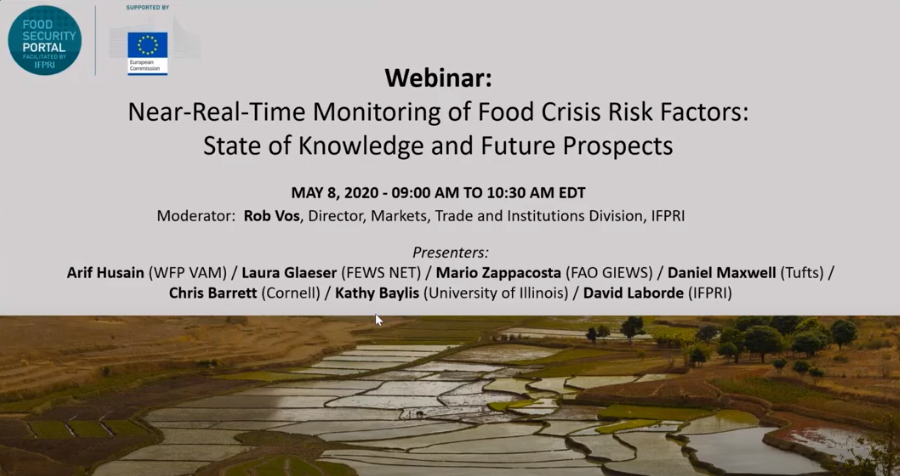
Multi-Stakeholder Approach to Digital Health & Nutrition Amidst COVID-19 Response
Host: Global Digital Health Network (GDHN)
Speakers: Marelize Gorgens (World Bank), Riccardo Lampariello (Terre des hommes), Miriam Chang (World Vision), Claudia Juech (Cloudera Foundation)
Moderator: Steve Ollis (GDHN)
Date: 30 April 2020
This webinar was presented as part of the April 2020 meeting of the Global Digital Health Network and featured a panel discussion on Multi-Stakeholder Approach to Digital Health & Nutrition Amidst COVID-19 Response. Panelists included representatives of the Alliance for integrated e-DIAgnostic (ALeDIA) initiative consortium: World Vision, Action contre la faim (Action Against Hunger), and Terre des hommes. Presentations addressed the challenges and opportunities of using the integrated digital solutions and multi-stakeholder to measure nutritional status.
View the original post [LINK]
Watch the recording [LINK] Password: 8d=UVnY.
Supporting Materials:
- Slide deck [LINK]
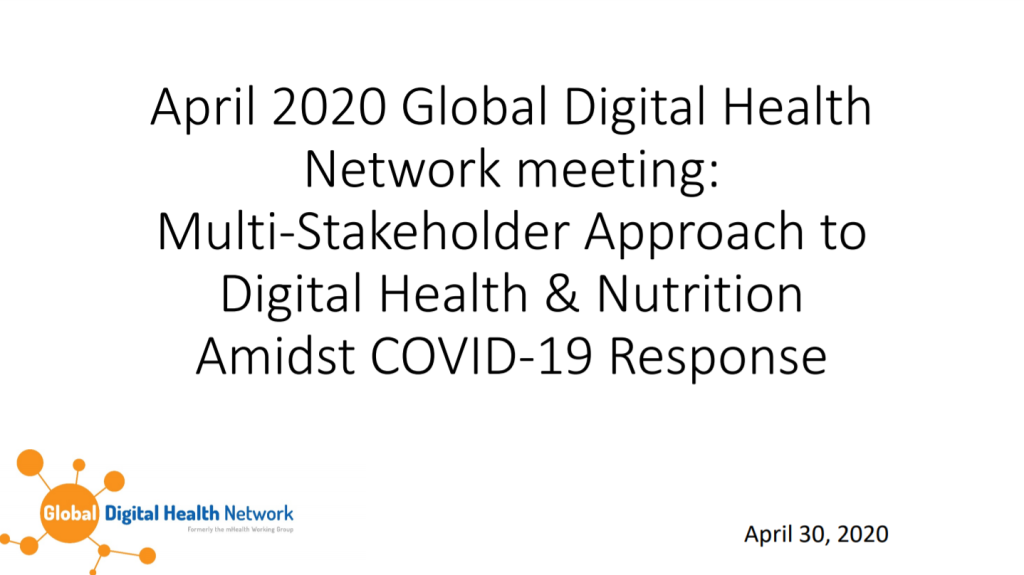
Discussion on Challenges and Strategies for M&E in the Time of COVID-19
Institutional Host: Food Security and Nutrition (FSN) Network
Speakers: Simon Fuchs (International Rescue Committee), Alexandra Guzman (Save the Children)
Moderators: Maja Persson (Implementer-led Design, Evidence, Analysis, and Learning initiative), Lloyd Banwart (Implementer-led Design, Evidence, Analysis, and Learning initiative), Amina Ferati (International Advisory Products and Systems)
Date: 01 April 2020
This webinar was hosted by the FSN Network and led by United States Agency for International Development’s (USAID) Implementer-led Design, Evidence, Analysis, and Learning (IDEAL) initiative to support the monitoring & evaluation (M&E) community in adapting to COVID-19. Panelists shared challenges and approaches implemented by the International Rescue Committee (IRC) in Columbia, Save the Children in Venezuela, and International Advisory Products and Systems (i-APS) across global contexts. Following the webinar, the Food Security and Nutrition Network hosted a discussion to foster additional sharing of experiences and resources here.
Watch the recording [LINK]
Supporting Materials:
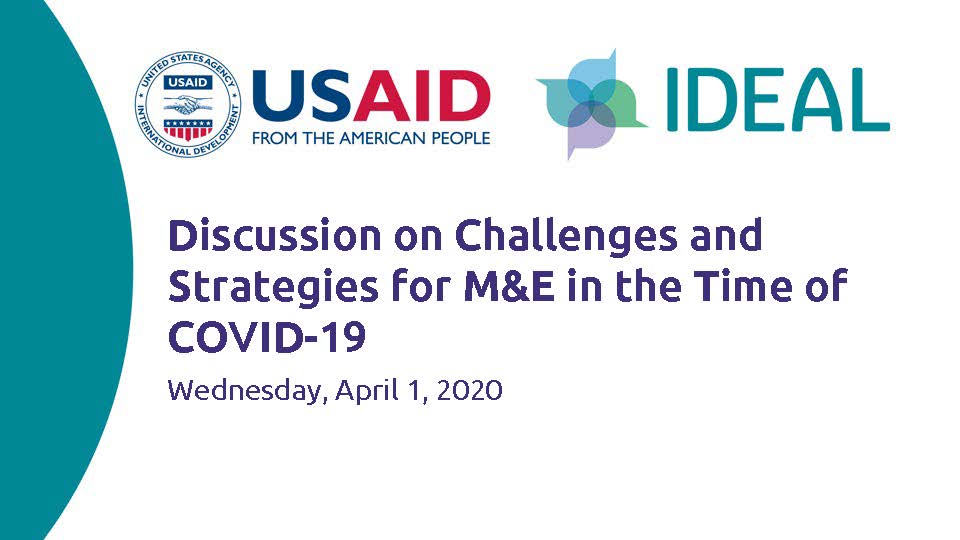
The Next Crisis Wave of COVID-19: Impacts on Household Food Security and Nutrition and Preparedness Considerations
Institutional Host: READY initiative
Speakers: Simon Fuchs (International Rescue Committee), Alexandra Guzman (Save the Children)
Moderators: Mija-tesse Ververs (Johns Hopkins Center for Humanitarian Health), Sarah O’Flynn, (Save the Children)
Date: 27 May 2020
This webinar was hosted as part of the READY initiative’s “COVID-19 & Humanitarian Settings: Knowledge & Experience Sharing” weekly webinar series which addresses technical areas, operations, and coordination issues impacted by COVID-19. Allison Oman Lawi spoke about the projected impacts of COVID-19 on nutrition, food security, and livelihoods—including dietary intake at the household level and food price monitoring—generated by the WFP’s Fill the Nutrition Gap analyses. Alexandra Rutishauser-Perera shared tools for monitoring nutrition in the context of COVID-19, and Kate Golden shared examples of how Concern Worldwide is adapting acute malnutrition treatment programs to the challenges of COVID-19.
View the original post [LINK]
Watch the recording [LINK]
Supporting Materials:
- Review: Innovations in Nutrition Information Systems [LINK]
- Guidance: Nutrition Information Management, Surveillance and Monitoring in the Context of COVID-19 [LINK]
- Report: 2020 Global Report on Food Crises [LINK]
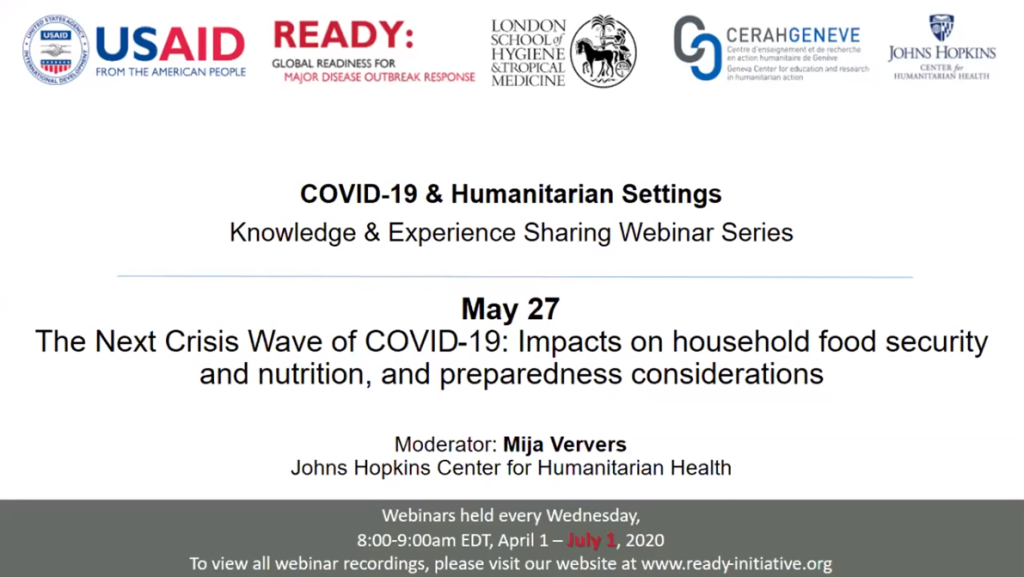
Protecting Maternal Nutrition in the COVID-19 Context
Institutional Host: Tech RRT
Speakers: Deborah Joy Wilson (WFP), Vani Sethi (UNICEF India), Nita Dalmiya (UNICEF), Yasire Ihtesham (WFP Pakistan), Ijaz Habib (WFP Pakistan), Jasinta Achen (UNICEF Somalia), Ciara Hogan (UNICEF Somalia), Pramila Ghimire (WFP Somalia), Daisy R. Nyaga (WFP Somalia), Colleen Emary (World Vision)
Moderator: Brooke Bauer (Tech RRT)
Date: 30 April 2020
This webinar was presented by Tech RRT, the WFP, and UNICEF, in collaboration with GTAM to provide an overview of maternal nutrition considerations during COVID-19 and share case studies in three country contexts—Somalia, India, and Pakistan. Panelists reviewed maternal nutrition considerations broadly with special attention on vulnerabilities that are exacerbated by COVID-19 and the recently released ‘Protecting Maternal Diets and Nutrition Services and Practice in the Context of COVID-19’ guidance. Key messages included incorporating maternal nutrition indicators within nutrition information systems, strengthening data and monitoring systems, and utilizing learnings from Fill the Nutrition Gap analyses and multi-agency collaboration.
Watch the recording [LINK]
Supporting Materials:
- Slide Deck (English) [LINK]
- Guidance: Protecting Maternal Diets and Nutrition Services and Practices in the Context of COVID-19 [LINK]
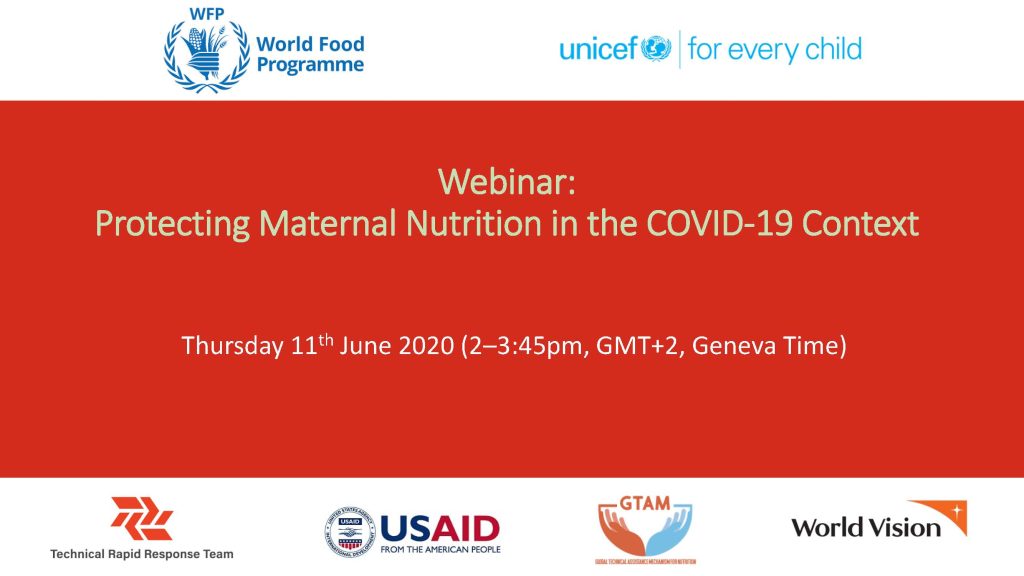
Other Relevant Resources
Data visualizations of COVID-19’s food security and nutrition impact
Global Monitoring of School meals during COVID-19 School Closures [LINK]
- Institutional Host: WFP
HungerMap [LINK]
- Institutional Host: WFP
Global food system perspectives on COVID-19 (experience sharing) [LINK]
- Institutional Host: ANH Academy
Food Price Monitoring and Analysis [LINK]
- Institutional Host: FAO
COVID-19 High-Frequency Monitoring Dashboard [LINK]
- Institutional Host: World Bank
Data collection during COVID-19
Nutrition Information Management, Surveillance and Monitoring in the Context of COVID-19 [LINK]
- Institutional Authors: UNICEF, Global Nutrition Cluster, GTAM
Mobile Phone Panel Surveys in Developing Countries: A Practical Guide for Microdata Collection [LINK]
- Institutional Authors: World Bank Group
- Related Blog: Mobile Phone Surveys for Understanding COVID-19 Impacts: Part I Sampling and Mode [LINK]
Best practices for conducting phone surveys during COVID-19 [LINK]
- Institutional Author: J-PAL
Multiple Indicator Cluster Survey (MICS) Plus [LINK]
- Institutional Authors: UNICEF MICS
